
May 15
1756 The Seven Years War begins:
The Seven Years War, a global conflict known in America as the French and Indian War, officially begins when England declares war on France. However, fighting and skirmishes between England and France had been going on in North America for years.
In the early 1750s, French expansion into the Ohio River valley repeatedly brought France into armed conflict with the British colonies. In 1756—the first official year of fighting in the Seven Years War—the British suffered a series of defeats against the French and their broad network of Native American alliances. However, in 1757, British Prime Minister William Pitt (the older) recognized the potential of imperial expansion that would come out of victory against the French and borrowed heavily to fund an expanded war effort. Pitt financed Prussia's struggle against France and her allies in Europe and reimbursed the colonies for the raising of armies in North America.
By 1760, the French had been expelled from Canada, and by 1763 all of France's allies in Europe had either made a separate peace with Prussia or had been defeated. In addition, Spanish attempts to aid France in the Americas had failed, and France also suffered defeats against British forces in India.
The Seven Years War ended with the signing of the treaties of Hubertusburg and Paris in February 1763. In the Treaty of Paris, France lost all claims to Canada and gave Louisiana to Spain, while Britain received Spanish Florida, Upper Canada, and various French holdings overseas. The treaty ensured the colonial and maritime supremacy of Britain and strengthened the 13 American colonies by removing their European rivals to the north and the south. Fifteen years later, French bitterness over the loss of most of their colonial empire contributed to their intervention in the American Revolution on the side of the Patriots. (History.com)
1911 Birth: Herta Oberheuser: Nazi doctor:

[She] killed children with oil and Evipan injections, then removed their limbs and vital organs. The time from the injection to death was between three and five minutes, with the person being fully conscious until the last moment.
She made some of the most gruesome and painful medical experiments during World War II, focused on deliberately inflicting wounds on the subjects. In order to simulate the combat wounds of German soldiers fighting in the war, Herta Oberheuser rubbed foreign objects, such as wood, rusty nails, slivers of glass, dirt or sawdust into the wounds.
After World War II, in October 1946, the Nuremberg Medical Trial began, lasting until August of 1947. Twenty-tree German physicians and scientists were accused of performing vile and potentially lethal medical experiments on concentration camp inmates and other living human subjects between 1933 and 1945. Fifteen defendants were found guilty, and eight were acquitted. Of the 15, seven were given the death penalty and eight imprisoned.
Herta Oberheuser was the only female defendant in the medical trial. She received a 20 year sentence but was released in April 1952 and became a family doctor at Stocksee in Germany. Her license to practice medicine was revoked in 1958.
1914 Wunderwaffen:

US rocket scientist Robert H. Goddard files two important patents; one for a multi-stage rocket and one for a rocket powered with liquid nitrous oxide and petrol. (Burrows, Riper, Gruntman)
Wernher von Braun: [Goddard was] ahead of us all [and] in the light of what has happened since his untimely death, we can only wonder what might have been if America realized earlier the implications of his work. I have not the slightest doubt that the United States today [1950's] would enjoy unchallenged leadership in space exploration had adequate recognition been accorded to him.
[See: Wunderwaffen: Hitler's Deception and the History of Rocketry.]1915 World War I: Various:

List Regiment: Gefreiter Adolf Hitler's 16 Reserve Infantry Regiment continues to occupy a position at Fromelles (pictured above in a drawing by Hitler), which is on a level field with water channels, willow trees and willow stalks. In the distance towards the enemy lines lies an insignificant wood with barbed wire entanglements. Under the direction of their defense-minded commander, Lieutenant General Gustav Scanzoni von Lichtenfels, the regiment works ceaselessly day and night to further fortify their position at Fromelles while fighting off repeated assaults by the enemy. [For further details, Click here.]
Forming part of French Commander-in-Chief Joseph Joffre's Artois Offensive in the spring of 1915, his second large-scale infantry assault following the Champagne Offensive in December 1914, the [battle], in the Ypres Salient, was fought by the Allies (British, Canadian and Indian troops) against the Germans from 15-27 May 1915.
The Festubert attack was launched by Sir Douglas Haig in response to pressure applied to the British Expeditionary Force (BEF) by Joffre, and was the BEF's second attack during the offensive, following an assault upon Neuve Chapelle four days earlier on 9 May. Preceded by a four day artillery bombardment by over 400 guns firing 100,000 shells, the attack around the village of Festubert was launched at night on 15 May by two divisions of mostly Indian infantry, and made rapid initial progress, despite the failure of the preliminary bombardment to effectively destroy the German Sixth Army front line defences (under Crown Prince Rupprecht). Under attack, the Germans retreated to a line directly in front of the village.
A further assault upon these lines, by Canadian troops, was begun on 18 May, but was unsuccessful in the face of German artillery fire. In heavy rain some Allied troops began to prepare trenches to consolidate the small gains made thus far. During that same evening the German front line received a further injection of reserves.
Renewed attacks by the Allied forces between 20-24 May resulted in the capture of Festubert village itself, a position held until the German advance of spring 1918. Despite having captured Festubert however, the Allied forces had advanced less than a kilometre; consequently the attack was ended on 27 May, with the British having suffered some 16,000 casualties during the action.
1916 World War I: Various:
List Regiment: Gefreiter Adolf Hitler endures trench warfare in Flanders (Artois) with 3 Company, 16 Reserve Infantry Regiment [List Regiment]. [For further details, Click here.]
The Battle of Asiago (Battle of the Plateaux) or the Trentino Offensive (in Italian: Battaglia degli Altipiani), nicknamed Strafexpedition ("Punitive expedition") by the Austrians, was a counteroffensive launched by the Austro-Hungarians on the Italian Front . . . . It was an unexpected attack that took place near Asiago in the province of Vicenza (now in northeast Italy, then on the Italian side of the border between the Kingdom of Italy and Austria-Hungary).
Official Italian Statement on the Asiago Offensive:
The plan of the invasion of Italy on these weak frontiers was the most familiar to Austria in all its military manoeuvres, the most studied and thought over by the Supreme Command, and especially by the Commander in Chief, General Conrad von Hotzendorf, who was wholly in favour of the campaign in the Trentino. Germany had decided on the destruction of France and the British Army, and Austria had decided on her 'Punitive Campaign.' Conrad's choice to attack by way of the Trentino, under snow until Spring, was well advanced; and the necessity of regulating the Balkan disturbances prevented simultaneous attacks. The undertaking against Italy, which would be invaded and forced to a separate peace, was a foregone conclusion. [For further details, Click here.]
1917 World War I: Various:
List Regiment: Gefreiter Adolf Hitler's 16 Reserve Infantry Regiment, 3 Company, participate in the Arras action, being deployed east of Vimy Ridge. [For further details, Click here.]
France:
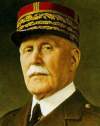
Nivelle is replaced by General Philippe Petain (above), who quells the mutiny in the French army and restores the situation with a combination of tact, firmness, and justice. French counterintelligence completely blots out all news of the mutiny, even from the Germans.
Russian Revolution: Manifesto of Russian Council of Workmen and Soldiers:
Soldiers and comrades at the front, we speak to you in the name of the Russian revolutionary democracy. The people did not wish the war, which was begun by the Emperors and capitalists of all countries; and therefore, after the abdication of the Czar, the people considered it urgent to end the war as rapidly as possible. Do not forget, soldiers and comrades, that the regiments of William are destroying revolutionary Russia. Do not forget that the loss of free Russia would be a catastrophe, not only to us, but to the working classes of the entire world. Defend, therefore, revolutionary Russia with all your power. [For further details, Click here.]
1918 World War I: List Regiment: Gefreiter Adolf Hitler's 16th RIR is sent back to hold a sector near an earlier position at Laon. [For further details, Click here.]
1922 The German-Polish Convention is signed: Upper Silesia is returned to Germany and the minority rights of its Jews are guaranteed. (THP)
1928 Mickey and Minnie Mouse: Release of the animated short "Plane Crazy", featuring the first appearances of Mickey and Minnie Mouse. Note: Mickey will become a favorite of both Mussolini and Hitler, who will one day receive a stack of the American mouse's movies from Goebbels as a birthday present.
1932 Japan: May 15 Incident: In an attempted coup, the Prime Minister of Japan, Inukai Tsuyoshi, is killed. Admiral Saito Makoto becomes Prime Minister. The original assassination plan included killing Charlie Chaplin, the film star who happened to be visiting Japan at the time. When the prime minister and his family members were killed, that his son, Ken Inukai, was watching a Sumo wrestling match with Charlie Chaplin, probably saved Ken and Chaplin. Note: All of the conspirators, including the gunmen, will be out of jail by 1940.
[See: Countdown to Infamy: Timeline to Pearl Harbor.]1933 Holocaust: Erbhoefe, a Nazi law regarding hereditary domains is published. No Jew or Negro can be part of these family holdings. (THP)
[See: What Was the Nature of Hitler's Anti-Semitism?]
1934 Church and Reich: National Socialist priest, Wilhelm Senn, hails Adolf Hitler as "the tool of God, called upon to overcome Judaism" (THP)
[See: Was Adolf Hitler a Christian?]1934 Latvia: Jewish autonomy is abolished after a coup led by Karlis Ulimanis. There are some 94,000 Jews living in Latvia at this time.
1939 Various:

The SS St. Louis—loaded with 930 Jewish refugees—hits the open sea from Hamburg bound for Cuba.
[See: Was America Complicit in the Holocaust?]Ravensbrueck—a concentration camp for women—is established.
[See: How Widespread Was Guilty Knowledge of the Holocaust?]1940 World War II: Various:
The Kingdom of the Netherlands officially surrenders to the Germans at 11 AM.
[See: Was Adolf Hitler a 'Great' Military Leader?]War in the Air: British Air Marshal Sir Hugh Dowding convinces the War Cabinet not to send any more RAF fighter aircraft to France. The decision is also made to send a strategic bombing raid against the Ruhr.
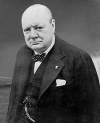
Churchill begins sending a long series of telegrams to President Roosevelt asking for American aid. In his first message, which he signs as 'Former Naval Person,' Churchill presents a long list of requests for destroyers, aircraft, and other arms.
[See: Why Did the US Join the Fight Against Hitler?]1941 World War II: Various:
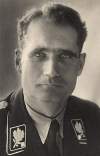
From notes of an interview of Hess by Sir Ivone Kirkpatrick, an expert on German affairs:
I then threw a fly over him about Ireland. He said that in all his talks with Hitler, the subject of Ireland had never been mentioned except incidentally. Ireland had done nothing for Germany in this war and it was therefore to be supposed that Hitler would not concern himself in Anglo-Irish relations. We had some little conversation about the difficulty of reconciling the wishes of the South and North and from this we pass to American interest in Ireland, and so to America.
On the subject of America, Hess took the following line: 1. The Germans reckoned with American intervention and were not afraid of it. They knew all about American aircraft production and the quality of the aircraft. Germany could outbuild England and America combined. 2. Germany had no designs on America. The so-called German peril was a ludicrous figment of imagination. Hitler's interests were European. 3. If we made peace now, America would be furious. America really wanted to inhabit the British Empire.
Hess concluded by saying that Hitler really wanted a permanent understanding with us on a basis which preserved the Empire intact. His own flight was intended to give us a chance of opening conversations without loss of prestige. If we reject this chance, it would be clear proof that we desired no understanding with Germany and Hitler would be entitled-in fact it would be his duty-to destroy us utterly and to keep us after the war in a state of permanent subjection.
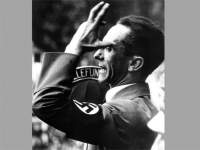
From Goebbels: The Man next to Hitler by Rudolf Semmler:
Goebbels spoke of Hess's mental illness and then described the comedy of Hess and his wife, who had been trying for years to produce an heir. No one knew for sure whether the child was really his. Hess was alleged to have been with his wife to astrologers, cartomancers, and other workers of magic and to have drunk all kinds of mixtures and potions before they were successful in begetting a child. Frau Goebbels remembered that Frau Hess had told her for five or six years in succession that she was at last going to have a child—generally because some prophet had predicted it. When the child arrived, Hess danced for joy. All the Gauleiters were instructed to send the Deputy Fuehrer a sack of earth from each Gau. This earth was scattered under a specially made cradle, so that the child symbolically started his life on German soil. Goebbels added that he himself had seriously considered—as Gauleiter of Berlin—whether he would not do best to send a Berlin paving stone.
[See: Why Would Hitler Approve Hess's Mission? and Did Adolf Hitler Approve Hess's Mission?]France:
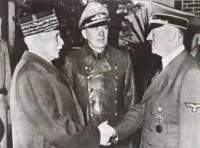
Petain announces a policy of total collaboration with Germany.
First Allied jet flies:
On May 15, 1941, the jet-propelled Gloster-Whittle E 28/39 aircraft flies successfully over Cranwell, England, in the first test of an Allied aircraft using jet propulsion. The aircraft's turbojet engine, which produced a powerful thrust of hot air, was devised by Frank Whittle, an English aviation engineer and pilot generally regarded as the father of the jet engine.
Whittle, born in Coventry in 1907, was the son of a mechanic. At the age of 16, he joined the Royal Air Force (RAF) as an aircraft apprentice at Cranwell and in 1926 passed a medical exam to become a pilot and joined the RAF College. He won a reputation as a daredevil flier and in 1928 wrote a senior thesis entitled Future Developments in Aircraft Design, which discussed the possibilities of rocket propulsion.
From the first Wright brothers flight in 1903 to the first jet flight in 1939, most airplanes were propeller driven. In 1910, the French inventor Henri Coanda built a jet-propelled bi-plane, but it crashed on its maiden flight and never flew again. Coanda's aircraft attracted little notice, and engineers stuck with propeller technology; even though they realized early on that propellers would never overcome certain inherent limitations, especially in regard to speed.
After graduating from the RAF college, Whittle was posted to a fighter squadron, and in his spare time he worked out the essentials of the modern turbojet engine. A flying instructor, impressed with his propulsion ideas, introduced him to the Air Ministry and a private turbine engineering firm, but both ridiculed Whittle's ideas as impractical. In 1930, he patented his jet engine concept and in 1936 formed the company Power Jets Ltd. to build and test his invention. In 1937, he tested his first jet engine on the ground. He still received only limited funding and support, and on August 27, 1939, the German Heinkel He 178, designed by Hans Joachim Pabst von Ohain, made the first jet flight in history. The German prototype jet was developed independently of Whittle's efforts.
One week after the flight of the He 178, World War II broke out in Europe, and Whittle's project got a further lease of life. The Air Ministry commissioned a new jet engine from Power Jets and asked the Gloster Aircraft Company to build an experimental aircraft to accommodate it, specified as E 28/39. On May 15, 1941, the jet-propelled Gloster-Whittle E 28/39 flew, beating out a jet prototype being developed by the same British turbine company that earlier balked at his ideas. In its initial tests, Whittle's aircraft—flown by the test pilot Gerry Sayer—achieved a top speed of 370 mph at 25,000 feet, faster than the Spitfire or any other conventional propeller-driven machine.
As the Gloster Aircraft Company worked on an operational turbojet aircraft for combat, Whittle aided the Americans in their successful development of a jet prototype. With Whittle's blessing, the British government took over Power Jets Ltd. in 1944. By this time, Britain's Gloster Meteor jet aircraft were in service with the RAF, going up against Germany's jet-powered Messerschmitt Me 262s in the skies over Europe.
Whittle retired from the RAF in 1948 with the rank of air commodore. That year, he was awarded 100,000 pounds by the Royal Commission on Awards to Inventors and was knighted. His book Jet: The Story of a Pioneer was published in 1953. In 1977, he became a research professor at the United States Naval Academy in Annapolis, Maryland. He died in Columbia, Maryland, in 1996. (History.com)
Medical experiments: From a letter addressed to the Reichsfuehrer SS, and signed S. Rascher:
For the time being I have been assigned to the Luftgau Commando VII, Munich, for a medical course. During this course, where researches on high-altitude flights play a prominent part (determined by the somewhat higher ceiling of the English fighter planes), considerable regret was expressed at the fact that no tests with human material had yet been possible for us, as such experiments are very dangerous and nobody volunteers for them. I put, therefore, the serious question: Can you make available two or three professional criminals for these experiments?
The experiments are made at Bodenstandige Prufstelle fur Hohenforschung der Luftwaffe, Munich. The experiments, by which the subjects may, of course, die, would take place with my cooperation. They are essential for researches on high-altitude flight and cannot be carried out, as has been tried, with monkeys, who offer entirely different test-conditions. I have had a very confidential talk with the deputy of the Surgeon of the Air Force, who makes these experiments. He is also of the opinion that the problem in question could only be solved by experiments on human beings. (Feeble-minded could also be used as test material.)
1942 World War II: Various:
USA: Gasoline rationing, limiting sales to three gallons a week for non-essential vehicles, goes into effect in 17 states.
Ronald Reagan applies for transfer to Army Air Force:
On this day in 1942, Lieutenant Ronald Reagan, a cavalry officer, applies for reassignment to the Army Air Force, where he would eventually put his thespian background to use on World War II propaganda films.
The transfer was approved on June 9, 1942, and Reagan was given a job as a public relations officer for the First Motion Picture Unit. The First Motion Picture Unit (FMPU)—its acronym was pronounced fum-poo—produced military training, morale and propaganda films to aid the war effort. FMPU released Frank Capra's Why We Fight series and a documentary of the bomber Memphis Belle, the crew of which completed a standard-setting 35 bombing missions in Europe. The films were screened on domestic training grounds and in troop camps overseas as well as in movie theaters at home.
Another film, Air Force, which was later renamed Beyond the Line of Duty, conveyed the true story of the heroic feats of aviator Shorty Wheliss and his crew, featuring narration by Ronald Reagan. The documentary, originally intended to promote investment in war bonds, won an Academy Award in 1943 for best short subject. Reagan went on to narrate or star in three more shorts for FMPU including For God and Country, Cadet Classification and the The Rear Gunner. Reagan also appeared as Johnny Jones in the 1943 full-length musical film This is the Army. (History.com)
USA: A bill establishing a women's corps in the US Army becomes law, creating the Women's Auxiliary Army Corps (WAACs), and granting women official military status. The WAACs gain official status and salary, but still not all the benefits accorded to men. Thousands of women will enlist as the result of this new legislation; and in July 1942, the 'auxiliary' will be dropped from the name, and the Women's Army Corps, or WACs, will receive full Army benefits in keeping with their male counterparts. The WACs will perform a wide variety of jobs, 'releasing a man for combat', as the Army, sensitive to public misgivings about women in the military, touts. But these jobs will range from clerk to radio operator, electrician to air-traffic controller. Women will serve in virtually every theater of engagement, from North Africa to Asia. It will take until 1978 before the Army will become sexually integrated, and women as merely an 'auxiliary arm' in the military will be history. And it will not be until 1980 that 16,000 women who had joined the earlier WAACs will receive veterans' benefits.
Holocaust: Warsaw Ghetto: From the Diary of Adam Czerniakow, Chairman of the Judenrat:
In town, the rumors about deportations continue. People speak of tens of thousands. To work according to plan under such conditions is remarkable. Nevertheless, we do the job day by day. I always go back to what Dickens wrote: 'A watch is not wound with tears.' In the afternoon the film people took pictures in the bedroom of the neighbors, the Zabludowski family. They brought in some woman who made up her face in front of the mirror. [For further details, Click here.]
1943 World War II: Various:

Comintern: In a move to placate his allies, Joseph Stalin dissolves the Comintern (or Third International). Note: The Comintern's stated purpose was to spread Communism to the other nations of the Earth, particularly Capitalist nations.
[See: Worst Dictator of Modern Times: Hitler or Stalin?]Holocaust: Polish Underground Press on Warsaw Ghetto Resistance:
The resistance of the Jews at the time of the final liquidation of the Warsaw ghetto was not, as some of the Underground press reported, collective resistance indicating a certain change in the attitude of the remaining Jews. If the great majority of the Jews of Europe remained entirely passive when they were killed, so the remnant, in their racially based materialism, have remained without any motivation to resist. Only a tiny fraction of some tens of thousands of Jews remaining in Warsaw, about 10 percent, joined the struggle under Communist influence. The Jews who resisted were not those registered in the ghetto, they were the "wild" residents of the ghetto. As against this, the registered Jews, those who report for work, took no part in the operation and surrendered to the Germans in great numbers, and were taken by them according to the old system to the new slaughter center at Majdanek.
The resistance and the supply of arms to a population of tens of thousands in the ghetto was organized and carried out by the Bund and the Communists. These were elements that showed the most hostile attitudes towards the Poles during the period of the occupation, and they prepared themselves within the framework of Communist organizations for a blood-bath directed against the Poles during the crucial transitional period.
According to the Communist plan, the ghetto was to have been used as a spur for an uprising at too early a time, which the PPR** is seeking to bring about. There were Communist printing presses for a long time in the ghetto, there were arms depots and Communist staff groups, and from there Soviet officers directed diversionary actions. In view of this fact, we may evaluate the Jewish resistance as a positive element, for it caused the premature liquidation of one of the armed positions of the Communists.
1944 World War II: Various:
Stalin to FDR and Churchill:
Your joint message received. You can best decide how and in what way to allocate your forces. The important thing, of course, is to ensure complete success for "Overlord". I express confidence also in the success of the offensive launched in Italy.
Holocaust: Hungary:
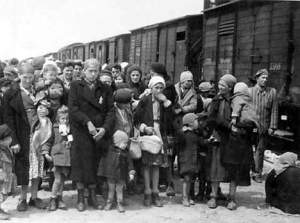
The deportations of Hungarian Jews to Auschwitz begins. By the end of June, a total of 381,000 Jews have been deported to Auschwitz, including more than 289,000 from Ruthenia and northern Transylvania. (THP) [See: The Deportation of the Hungarian Jews.]
1945 World War II: Various:
Europe: Last skirmish of the Second World War in Europe fought near Prevalje, Slovenia.
War in the Pacific: Heavy fighting continues on Okinawa.
1946 Nuremberg Tribunal: On the 130th day of the trial, Admiral Erich Raeder takes the stand:
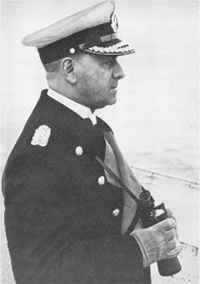
Perhaps I became rather one-sided, since this fight for the reconstruction of the Navy filled all my time and prevented me from taking part in any matters not directly concerned with it. In addition to material reconstruction, I put every effort into the formation of a competent officer corps and well-trained, especially well-disciplined, crews. Admiral Doenitz has already commented on the result of this training of our men and officers, and I should like only to confirm that these German naval men earned full recognition in peace-time, both at home and abroad, for their dignified and good behavior and their discipline; and also during the war, when they fought to the end in an exemplary manner, in complete unity, with irreproachable battle ethics, and, in general, did not participate in any kind of atrocities. [For this days full testimony, Click here.]
From Justice at Nuremberg by Robert E. Conot:During his interrogation in Moscow, Raeder had unburdened himself of some of his feelings about his fellow leaders in the Wehrmacht; and his opinions were now read in court. 'Speer flattered Doenitz's vanity, and vice versa,' Raeder declared. 'Doenitz's strong political party inclination brought him difficulties as head of the navy. His last speech to the Hitler Youth, which was ridiculed in all circles, gave him in the navy the nickname of Hitlerbube Doenitz (Hitlerboy Doenitz).' 'Keitel,' Raeder said, was 'a man of unimaginable weakness, who owes his long stay in his position to this characteristic. The Fuehrer could treat him as badly as he wished—he stood for it.' 'Goering,' Raeder asserted, 'had a disastrous effect on the fate of the German Reich. His main peculiarities were unimaginable vanity and immeasurable ambition, running after popularity and showing off, untruthfulness, impracticality, and selfishness. He was outstanding in his greed, wastefulness, and soft unsoldierly manner.' Doenitz, who had to sit brushing shoulders with Raeder for another three months, exploded: 'A pissed-off jealous old man!'
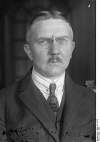
Hjalmar Schacht's reaction to Raeder's first day of testimony: "He disapproved of aggressive war and was deceived by Hitler, but he planned and began the aggressive war. That's a militarist for you." (Tusa)
1948 Israel: Hours after declaring its independence, the new state of Israel is attacked by Transjordan, Egypt, Syria, Iraq and Lebanon.
1955 The Vienna Treaty—signed by Britain, France, the United States, and the USSR—restores Austria's independence.
[See: Austria: The Other Germany.]1955 Spandau Prison: From Spandau: The Secret Diaries by Albert Speer:
Routine visit from the British general. He does not seem as pleasant as his predecessor. Raeder, who is feeling better, wanted to say something about his illness, but was so keyed up that he could not produce a word. The British director urged him to sit down. Luckily, Schirach, instead of making any personal request, called the generals attention to the danger hovering over Raeder. (Speer II)

1957 Wunderwaffen: The first testing of a new missile codenamed 8K71, soon renamed the R-7 Semyorka, takes place. Though based on German technology and built with the help of German scientists, the rocket boasts several important Soviet innovations. (Menaul)
From Dulles: A Biography of Eleanor, Allen, and John Foster Dulles and Their Family Network by Leonard Mosley:The U-2 (high-altitude spy-plane) had cost a fortune to develop, but its pioneer, Richard Bissell, saw well ahead of time that it would soon become outmoded and the next stage of extraterrestrial surveillance would have to be developed. He went to Allen (Dulles, the Director of Central Intelligence) and said: "I am very worried that the Russians are getting ahead of us in rocketry and space. In your capacity as head of psychological warfare, you ought to persuade the administration to do something about it. Because if, in two or three years, the Russians have a space rocket and we have nothing, that could have a shattering effect across the world."
This was several months before the Soviet Union put Sputnik into space in October 1957, and though there were rumors and hints from CIA sources that t was coming, no one had yet responded to it. Allen suggested that Bissell go over and talk to the air force, who sent him on to Charles Wilson, the Secretary of Defense. The feeling around was that such things as space programs were "the kind of foolishness Democrats indulge in, and we Republicans cut down on." So once more, Allen agreed to fund money for a space satellite out of CIA secret funds, and went to see the President about it.
In February 1958, he called in Richard Bissell to see him. Edwin Land was already there. Allen said that the President had approved the development and operation of a reconnaissance satellite, and that Bissell would be in charge for the Agency and would have an Air Force officer as his co-director...Bissell knew less about space rockets than he had about U-2's, and he and his aides learned the hard way.
1960 Wunderwaffen: While Nikita Khrushchev and Dwight D. Eisenhower confer at a summit meeting, the Soviets launch their first satellite capable of housing human beings and designed to be recoverable. Khrushchev's triumph soon becomes an embarrassment, however. While the launch goes well, the recovery system fails and, instead of re-entering the earth�s atmosphere, the Sputnik is bounced into a higher orbit and is lost.
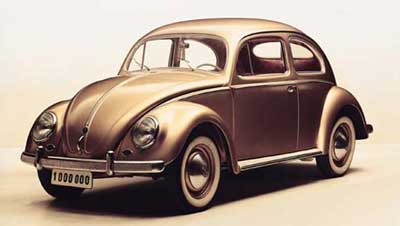
1981 Volkswagen: The twenty-millionth Beetle is produced at the plant in Puebla, Mexico. Volkswagen first came to Mexico in 1954 as part of a museum exhibit entitled Germany and Its Industry. That same year, two hundred and fifty Beetles were assembled in Mexico. By 1962, Volkswagen had acquired its first assembly plant in Xalostoc, where the company would eventually assemble 50,000 Beetles. Pleased with the new Latin American marketplace, Volkswagen executives made plans to construct a facility in Puebla, a city an hour south of Mexico City. In 1967 the first Beetle was produced at the Puebla plant. Mexico is the only country in the world that still manufactures the original Volkswagen Beetle. If you fly over Mexico City, a city of some twenty million inhabitants, it isn't hard to believe that you will have seen twenty million Beetles crawling around the city's vast highway.
[See: The Secret History of the Volkswagen.]2006 Iraq: Saddam Hussein refuses to enter a plea at his trial in Iraq for crimes against humanity, insisting he was still the country's president. [Note: A question was asked in the House of Commons toward the end of WWII, as to what a British soldier was expected to do if he should happen to encounter Adolf Hitler. The reply was that "I would leave it to the common sense of the soldier.]
Edited by Levi Bookin (Copy editor)
levi.bookin@gmail.com



Click to join 3rdReichStudies

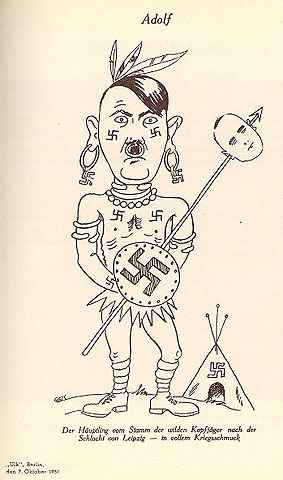
Disclaimer: This site includes diverse and controversial materials—such as excerpts from the writings of racists and anti-Semites—so that its readers can learn the nature and extent of hate and anti-Semitic discourse. It is our sincere belief that only the informed citizen can prevail over the ignorance of Racialist "thought." Far from approving these writings, this site condemns racism in all of its forms and manifestations.
Fair Use Notice: This site may contain copyrighted material the use of which has not always been specifically authorized by the copyright owner. We are making such material available in our efforts to advance understanding of historical, political, human rights, economic, democracy, scientific, environmental, and social justice issues, etc. We believe this constitutes a "fair use" of any such copyrighted material as provided for in section 107 of the US Copyright Law. In accordance with Title 17 U.S.C. Section 107, the material on this site is distributed without profit to those who have expressed a prior interest in receiving the included information for research and educational purposes. If you wish to use copyrighted material from this site for purposes of your own that go beyond 'fair use', you must obtain permission from the copyright owner.
Please Note: The list-owner and the moderators of 3rdReichStudies are not responsible for, and do not necessarily approve of, the random ads placed on our pages by our web server. They are, unfortunately, the price one pays for a 'free' website.